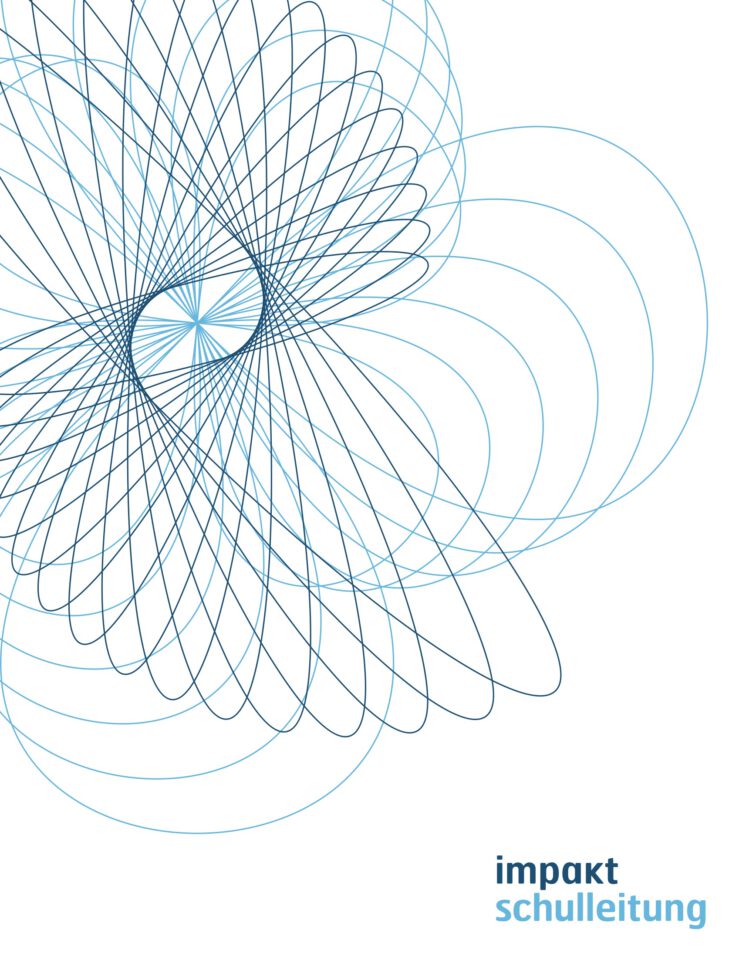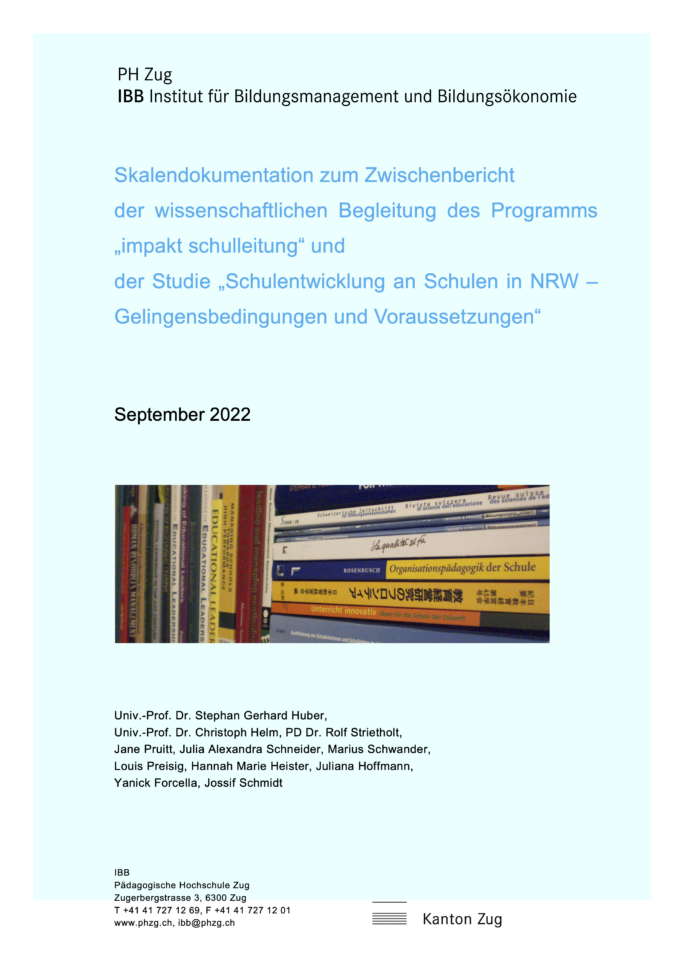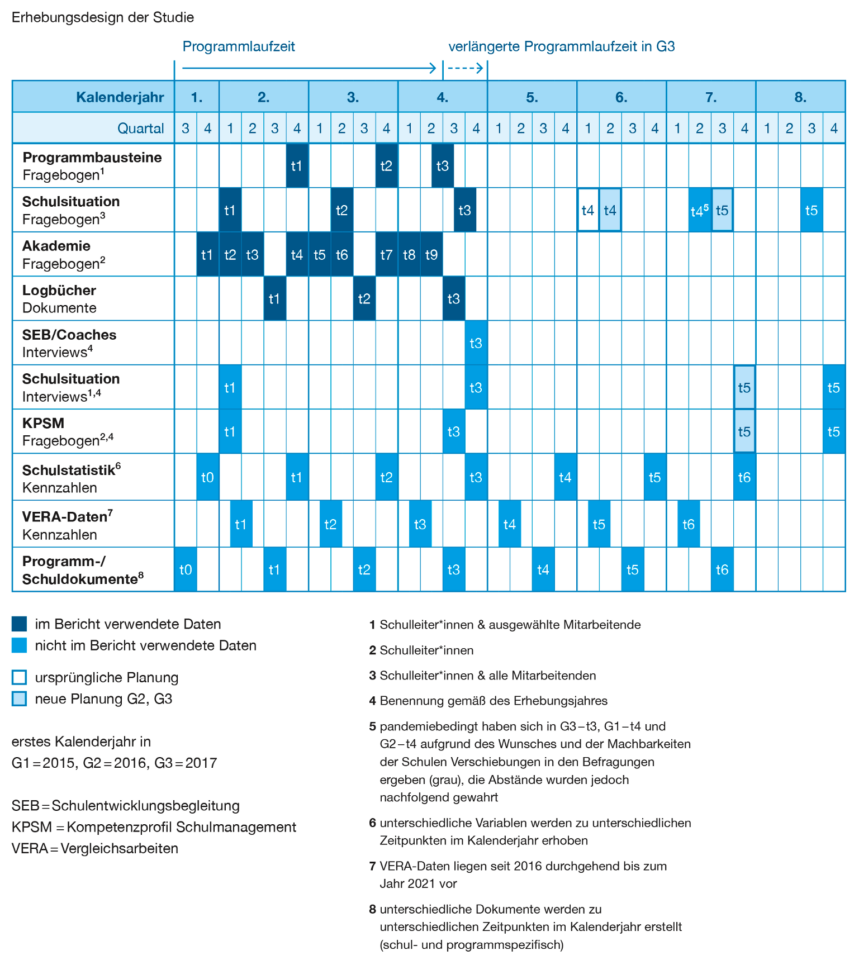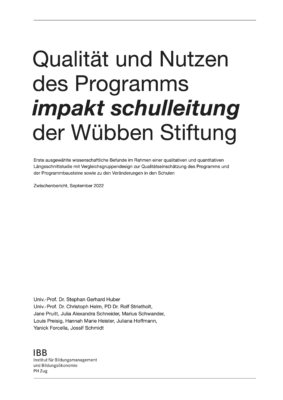impakt schulleitung
BRIEF DESCRIPTION
 »impakt schulleitung«, the school leadership program of the Wübben Foundation, supports school leaders of schools in challenging circumstances in the further development of their school. »impakt schulleitung« offers a comprehensive range of support to initiate a process that is tailored to the needs of the respective school.
»impakt schulleitung«, the school leadership program of the Wübben Foundation, supports school leaders of schools in challenging circumstances in the further development of their school. »impakt schulleitung« offers a comprehensive range of support to initiate a process that is tailored to the needs of the respective school.
The scientific monitoring of the program is carried out by a team led by Prof. Dr. Stephan Gerhard Huber. Three cohorts that participated in the »impakt schulleitung« program from 2015 to 2020 in North Rhine-Westphalia were accompanied. The longitudinal study considers the different perspectives of the individual actors and groups of actors and the different levels (programme, school, and person level). A mixed-method approach is chosen, i.e. quantitative and qualitative survey methods are used in combination.
INTERIM REPORT
The interim report (available only in German) contains the first results on the perceived quality and benefits of the program modules as well as initial evaluations of the content of the program modules coaching, school development consultancy, development funds, and the topics of the school development projects. In addition, the results on the effects of the program modules concerning selected quality dimensions and the quality changes in the schools are reported.
 Scale documentation for the interim report
Scale documentation for the interim report
A selection of the scales reported in the interim report can be found linked opposite (available only in German). The complete overview of all scales used in the study can be requested through schulentwicklung@bildungsmanagement.net.
OUTLOOK FOR NEXT REPORTS
In addition to this interim report, findings on the influence of the Corona pandemic, on the conditions for the success of the measures, and on the mechanisms of school quality development will be available soon. Further analyses also include the quality and role of school leaders for quality and quality development, especially for inclusive action or dealing with heterogeneity at the school site, the different assessments of school staff and school leaders, the role and quality of cooperation within the school staff, emotional attachment to the school and its consequences for the quality and development of the school, as well as the central role of the fit, especially the fit of school leaders to the school context or school culture. Illustrative case studies are also provided. In addition, analyses will be carried out with further information, such as statistical data of the school and learning performance data of the students as well as the comprehensive, various interview data with the implementers of the program modules, especially the coaches and school development consultants, and the school actors about the program modules and their schools.
The program »impakt schulleitung« of the Wübben Foundation aims
- to professionalize and strengthen school leaders of schools in challenging circumstances in their central fields of action, pedagogical leadership, and school management,
- to support them in the further development of their school through a concrete school development project in the field of instructional quality development, and
- to appreciate them for their work and to connect them with committed colleagues.
»impakt schulleitung« ran in North Rhine-Westphalia from 2015 to 2020 as a pilot project. Three program groups started in three administrative districts with a gap of one year in between cohorts, each with 25 school leaders. A total of 75 schools were involved in the programme.
The program is designed as a comprehensive 3-year support measure and consists of five components to use according to school-specific needs and the progress of the project. The program modules are coordinated in terms of content and follow the process architecture of a school development project over three program years. They are applied at the levels of leadership development, school development and networking and briefly described below.
- Academy program: Further training, exchange, networking
In 2.5 days, the academies offer space for inter-school networking, qualification, collegial consultation, and process-accompanying reflection. A total of nine academies (in 3 years) accompanies the school leaders in the planning and implementation of their individual school development projects with thematic inputs, impulse lectures, and practical reports. At the same time, the academies offer a protected space for personal development, for readjusting and securing leadership actions and school development processes, and for refueling and developing a professional learning community. - Coaching: Professionalizing school leaders
The school leaders have access to professional coaches who accompany the personal development of the participants on a confidential basis in 1:1 meetings. The focus and goals of the 10 sessions can be chosen by the coachees themselves. - Pit stops
Half-day events in the afternoon aim to promote the exchange of experiences and networking of school leaders with various groups of people from outside the professional learning community. - School development consultancy: Moderating processes
School development consultants accompany and support the process of pedagogical and organizational development of the school for three years. Each school has a quota of twelve hours of school development consultancy in the first and second program year and nine hours in the third program year. - Development Fund
Development projects or school development processes are financed in the amount of 3000€.
Within the framework of this professionalization program, people in school leadership functions are supported by a further training program of the academies and by coaching. In addition, school development is supported and thus an important function of school leadership is strengthened – its strategic action. This means that school-specific goals are identified, and measures are planned, designed, implemented, and secured in the long term, which help the school to preserve what has been tried and tested, to optimize what needs to be optimized in terms of effectiveness or efficiency and to introduce something new where it makes sense and is necessary. This is achieved through process consultancy that assists in strategic action within the framework of the school-specific strategy, especially in cooperation with the middle management (extended school management, school development group, special school development working groups) and additional financial funds to purchase things for which no resources are available, or which are not so easy to realize according to school law.
With its various modules, »impakt schulleitung« targets developments on several levels. Program components such as coaching and the academies are primarily aimed toward the school leaders. Measures such as school development consultancy or the development fund are more strongly directed at the development of the school as a whole, i.e., at the school leaders as well as the school development group and the entire school staff.
The different program modules of »impakt schulleitung« pick up the school leaders and their schools at their respective stages of development and initiate further individual measures of school development at the schools. In doing so, the schools set different priorities and take different measures due to their diversity and their different needs and requirements.
The unifying element of all levels and the common thread in the program is the school development project, which the school leaders develop, prepare, implement, and evaluate with the teams at their schools during the three years of the program.
The school development project is intended to contribute to the school and instructional quality development and thus ultimately to the improvement of the students’ learning. The local actors – school leaders, teachers, other pedagogical staff, and external supporters – work together to change teaching and learning to optimally accompany and support the students at their location. At the same time, the project serves as an example to work out central routines of action for school and instructional quality development and to anchor them in the schools in the long term.
Prof. Huber and his team are supporting the school leaders with the help of the self-assessment Competence Profile School Management – an Inventory for the Self-Assessment of School Leadership, which the school leaders can work on within the project phase and reflect on for themselves or together with their coach (www.Bildungsmanagement.net/CPSM).
An interlocking of the components and the control of developments on both levels are ensured by the professional accompaniment of the academy events and the exchange.
A team led by Prof. Dr. Stephan Gerhard Huber is researching and evaluating the program »impakt schulleitung« of the Wübben Foundation with an accompanying study.
The study examines change and development processes in schools in North Rhine-Westphalia over a longer period to understand the conditions for success and the prerequisites for school development.
A first interim report (available only in German) contains results on the perceived quality and benefits of the program modules as well as initial evaluations of the content of the program modules coaching, school development consultancy, development funds and the topics of the school development projects.
The research project examines support measures for school leaders of schools in challenging circumstances. It focuses on both their processes and their effects. While the focus of the impact is on the scientific examination of the impact of the program (effectiveness and sustainability of the achievement of the program’s goals, i.e., results), the process focus investigates the actors of the program and the other people involved in a processual or continuous manner. The central goal of the research project is therefore to analyze which personnel and school development processes as well as which effects unfold among school leaders and their schools.
The goal is to develop meaningful results and recommendations on how and under what conditions school leaders and schools with many students from non-educational families can be supported to improve school quality and increase the educational opportunities of disadvantaged children and youth.
The theoretical modelling is based on work on the state of research, conducted in the context of an expert report (Huber, 2013b), the special issue SchulVerwaltung spezial (Huber & Mujis, 2012), a working paper (Huber & Nicolaidou, 2013), and a symposium of the German Society for Educational Science 2016 (organized by Heinz Günter Holtappels and our involvement). Considering an additional analysis of the project design, the categories of the model were further sharpened and thus represent central mechanisms of action of the design.

These mechanisms of action are described in more detail below.
For the program »impakt schulleitung«, the program itself including the interventions (e.g., in the form of school-specific process consultancy) play an important role alongside the school supervisory authority, the QUA-LiS state institute and the school authorities: concerted action by these actors and intensive school development support appear necessary.
For the schools participating in the program, the framework conditions and resources can be described as input characteristics. These include the personnel, material and financial resources as well as the characteristics of the student body. In the visualization, examples of operationalization are given, e.g., whether the school leader position is occupied or how high the teaching provision is. Coordination of action can be considered as a throughput. It is shaped through school management and school development. Characteristics of school quality are modelled as outputs at the organizational level and characteristics, especially student outcomes (e.g., performance results), as outputs at the student level.
Theoretically, the accompanying study assumes a chain of effects based on the program logic, which can be outlined as follows: The support of the school leaders through concerted action resulting from the program components promotes the coordination of the schools’ actions, i.e. the promotion of a strategic and custom-fit personnel management that strengthens the school management – and thus, above all, a new, a strengthened or a skill-developed school leader. This in turn strengthens middle management, especially the subject based teams, the grade level-based teams and the work of the school development group. This increases the school’s overall management capacity. This in turn enhances the work of school development. As a result, strategically oriented cooperation, that is aligned to the learning processes, can be expanded, the coordination of action can be increased, and the school’s quality can be further developed. This quality enhancement can then in turn impact on teaching-learning arrangements and student outcomes. Good student outcomes, in turn, lead to a higher prestige for the school and a different professional and self-image for the actors working in the school.
Of course, quality characteristics at the student and organizational level in turn influence the coordination of action in terms of school management and school development. The visualization marks these interdependencies with arrows.
To strengthen schools in their overall coordination of action and to ensure their further development within the framework of classical school development work, the various actors need their own scope for action and responsibility as well as resources. In addition, the professionalization of the school actors is needed, who increase their motivation, competence, legitimacy and social acceptance through intensive school development consultancy, further training and coaching.
The central research questions of the accompanying study are:
A) Leadership Development-School Support:
- What is the impact of leadership development interventions on school leaders?
- How do the interventions of the school development consultancy impact school development?
- How do the interventions interact to affect school leadership and school development?
- What is the role of functional fits of interventions and intervention beneficiaries?
B) School Leadership/School Management-School Development-School Quality:
- How effective is school leadership for school development?
- What is the impact of school development measures on school quality, especially on students’ learning (or their learning performance)?
- What is the role of functional fits of leadership and organizational characteristics?
C) Intervention-specific questions
School development consultancy and coaching in the respective focus
- WHAT: Goals/expectations/topics/questions/problems/contents:
- What challenges and objectives are expressed for coaching and school development?
- What are the contents and topics of coaching and school development consultancy?
- How are they linked to the overall strategic directions?
- HOW: Practices/Processes/Use/Frameworks:
- What are the framework conditions?
- What approaches are being adopted? What is the role of coaches and school development consultants?
- How strongly is a distinction made between needs and wants? How much and how are comfort zones crossed?
- What are the processes of coaching and school development consultancy? What are the temporal structural characteristics?
- How do the school leaders or the people in the school act on their own initiative?
- How are quality characteristics assessed?
- When or why are changes made? Why is coaching stopped?
- Are there difficulties and what are they? What are critical events in coaching or school development consultancy?
- How is the school development consultant integrated into the school program work and the topics of school development?
- Is there resistance, from whom, how does it manifest itself, how is it overcome or not? What role do acceptance, trust and transparency play?
- How has the understanding (subjective theory) of coaching and school development consultancy changed?
- WHAT FOR: Benefit/Profit/Effectiveness/Meaningfulness/Effort-Benefit-Ratio/Fit/Success Conditions:
- How is the achievement of the goals assessed?
- How useful are coaching and school development consultancy? Under which conditions…?
- What is effective coaching, what is effective school development consultancy?
School development consultancy and coaching over time, from different perspectives, in interaction, also with further interventions
- Changes
- How do the assessments change over time or due to which condition?
- Multiperspectivity
- How does the view of school leaders and school development groups as well as the view of coaches and school development consultants differ regarding selected characteristics?
- Overall Concept/Coherence
- How are coaching and school development consultancy interrelated/interlocked, for which topics, with which approaches? How are coaching and school development consultancy interlinked with other measures?
Development funds in focus
How is the development fund used?
Academy program in focus
How is the academy program evaluated in terms of didactic features from the point of view of the school leaders?
Due to the objectives and questions, different methodological approaches are used, including qualitative and quantitative procedures of data collection and analysis. Qualitative data are mainly documents, interview data and open data in the questionnaires. Quantitative data are mainly existing data such as statistical key figures and data from the questionnaire surveys.
The methodological phases and steps build on each other. The research project therefore uses different data collection (and analysis) procedures. For the analyses, the qualitative and quantitative data are linked with each other.
The accompanying study is designed as a longitudinal study: Several surveys will be conducted over the project phase to analyze the development of the schools and the effect of leadership development measures on the competence development of school leaders and the effect of school development measures on organizational changes up to effects on exemplary learning performance.
The team is researching school development on the grounds of data from around 120 schools based on data from school leaders and school staff. Data on input, throughput, output, and outcome are available.
For the quantitative questionnaire surveys, a comparison group design was used. The comparison group and the participating schools are similar, i.e., the comparison group should be comparable to the schools participating in the program. The comparison group consists of eleven schools in Group 1, 26 schools in Group 2 and ten schools in Group 3, covering both similar and differentiating characteristics of the program group. Of the comparison schools, a total of 29 schools participated at the first and third survey time points.
The comparison group was selected according to the following criteria:
- the same government district as the schools of the respective cohort
- meets the selection criteria for participation in the program of the Wübben Foundation (location type 4 or 5)
- comparable distribution of competency levels or range on the educational standards metric and similar dispersion in the implementation of VERA-3 2015 and VERA-8 2016
- schools with a comparable number of students in the grade level participating in VERA
For the analysis of the quantitative data, multivariate methods will be used in addition to descriptive methods for the presentation of the various process and impact indicators. Multivariate methods can be used to consider the complex interaction of different factors. In addition to multivariate variance and regression analyses, structural equation models can also be used for this purpose. For the analysis of specific questions that are only recorded based on sub-samples, the analytical procedures are adapted to the sample size, i.e., non-parametric procedures are used.
The study examines the further development of the school and school leaders over the period of three (or six) years per cohort based on questionnaire surveys and interviews. The following figure illustrates the procedure and maps the times of the surveys (t0 – t9) of the corresponding data:

WÜBBEN FOUNDATION
The non-profit Wübben Foundation supports disadvantaged children and youth who, due to their background, find it particularly difficult to cope with the numerous challenges they face at school and in everyday life. To this end, the foundation supports actors in the education system in developing, disseminating, and improving effective services by providing funding, advice and networking.
More about the Wübben Foundation at: www.wuebben-stiftung.de
